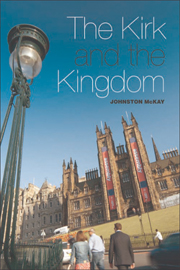5 - The House Divided Against Itself
The Kingdom of God in the Context of Debate
Published online by Cambridge University Press: 05 August 2013
Summary
Christ really meant his Kingdom to come on this earth, and all Kingdoms of this world, including the Kingdoms of trade, industry and politics, were to become a portion of his Kingdom
J. Y. Simpson, 1908The early sessions of the United Free Church General Assembly frequently saw debates on the merits of candidates who were proposed for professorships in the Church's three colleges in Aberdeen, Edinburgh and Glasgow. What is surprising today is how often ministers who became well known for their contribution to scholarship in one particular field had been proposed for a chair in an entirely different subject. Professor A. M. Hunter, for example, who became a widely acknowledged New Testament scholar, was originally proposed in 1919 to the United Free Church Assembly for the Chair of Church History in New College in Edinburgh, and some years later for the Chair of Christian Ethics in Aberdeen. James Moffat, who gained worldwide recognition as a scholar, interpreter and translator of the New Testament into popular language, was Professor of Church History in Glasgow for two years.
In 1911 the post of Professor of Christian Ethics and Practical Training in Trinity College Glasgow came to be filled at the General Assembly. The two front runners were William Clow, who, as we have seen, represented a very conservative approach to social theology, and Robert Drummond, minister of Lothian Road United Free Church, who said that all his life he had a glorious battle to fight against conservative obscurantism.
- Type
- Chapter
- Information
- The Kirk and the KingdomA Century of Tension in Scottish Social Theology 1830-1929, pp. 84 - 100Publisher: Edinburgh University PressPrint publication year: 2011



